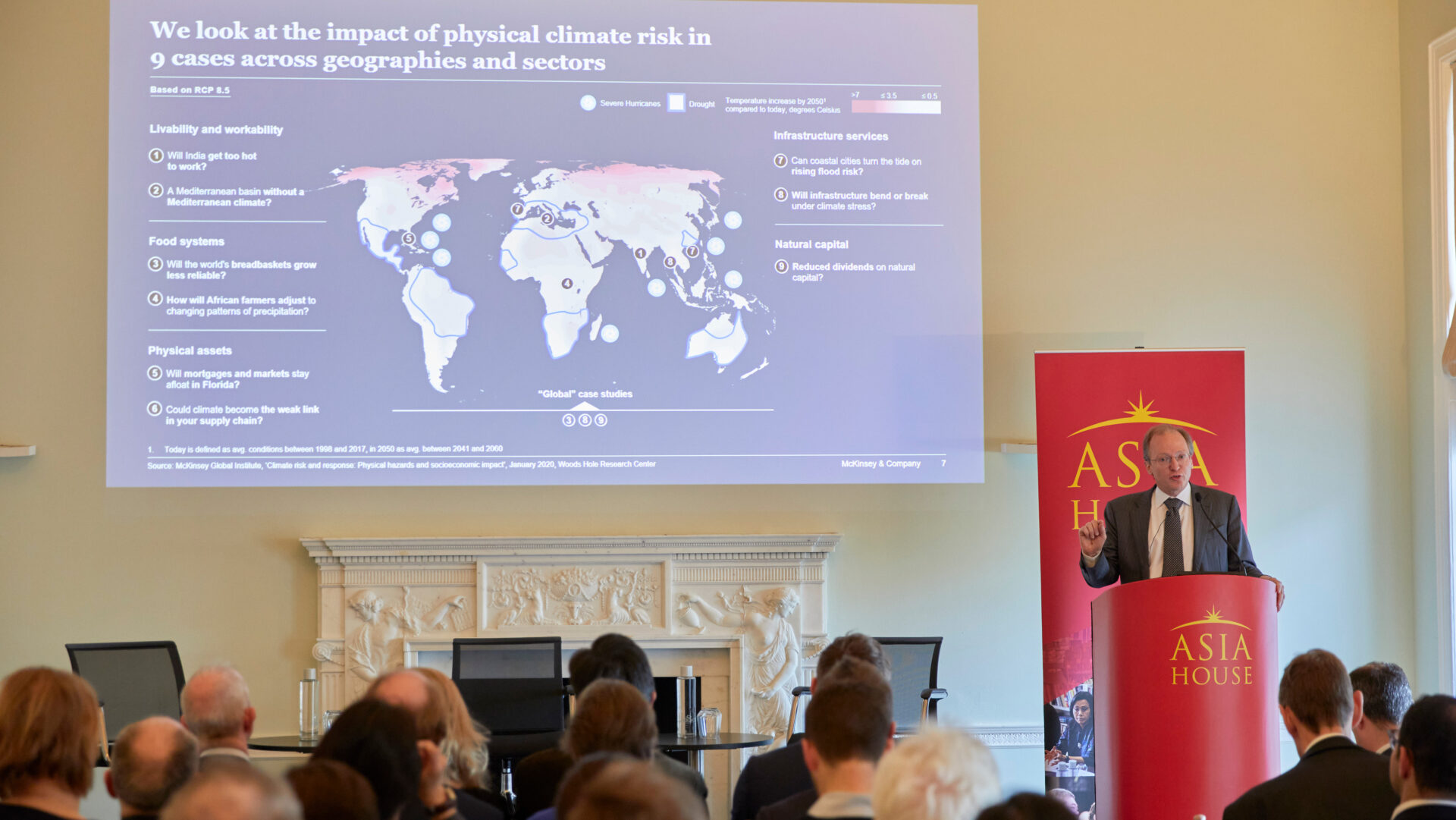Driving commercial and political engagement between Asia, the Middle East and Europe
Driving commercial and political engagement between Asia, the Middle East and Europe
Driving commercial and political engagement between Asia, the Middle East and Europe

“As we look at each and every event, the magnitude of the losses become bigger and that conversation becomes much more urgent.”
That was the view of Jonathan Woetzel, McKinsey Global Institute (MGI) Director and Senior Partner, at an Asia House conference examining the physical and socio-economic risks of climate change.
In a keynote speech at the ‘Climate Risk and Response: Physical Hazards and Socioeconomic Impacts’ conference, held in partnership with McKinsey & Company, Woetzel presented the results of MGI’s report on the subject. It assesses the nature and extent of the physical risk associated with climate change – including projections for certain regions and industries.
“We can’t really go back to the conversation about mitigation, without having a better understanding of what we are mitigating against,” Woetzel said as he introduced the research. With this new report, he argued, “we have a much better sense of what the bad news is.”
MGI’s research, examining six climate change indicators in 105 countries, produced some unnerving results. “Each and every one of the countries we looked at faces some kind of impact. Some will be drying out, some will be flooding, some will be heating up, but everybody gets a piece of this,” Woetzel warned.
The report highlights several outcomes by 2050 in the absence of further decarbonisation, including more people living in areas with an increasing probability of experiencing a lethal heatwave, as well as extreme spectrums of weather including too much rain and severe drought in different parts of the world.
The report does not aim to predict what will happen by 2050, but rather measures “the full inherent risk under a scenario of no further climate action.”
Woetzel said: “This is our impact. We’ve made a dent on the planet. We shouldn’t be too surprised perhaps, but now we have to deal with it.”
These physical risks will also have socio-economic consequences. Heatwaves in India will reduce the number of hours people can work outdoors, while floods in Ho Chi Minh City will damage wastewater plants, ports and railway stations. Supply chains will also be disrupted as East Asia is affected by climate change, the conference heard.
“We will, therefore, now need to think about optimising for efficiency less than optimising for resilience,” he said in regard to supply chains, adding that, “resilience in this case is almost a mindset shift.”
Food systems are also at risk due to the concentration of supply chains for efficiency. Only six areas in the world produce 60 per cent of grains worldwide. Therefore the “likelihood of both yield failure and yield oversupply is going to go up,” Woetzel said.
Particularly poor countries, with lower GDP per capital, will suffer the most due to climate risks. “It affects the least prepared the most,” Woetzel said. Emerging economies, in particular, usually depend more on natural capital, outdoor work and have the least resources.
These climate changes risks, he argues, are no longer “invisible to us”, but are instead “measurable in a decade on decade type of risk.” This increases the possibility that people will take climate change more seriously and make key choices in terms of mitigation and adaption.
“We are vulnerable, our systems are stressed,” Woetzel highlighted, adding that we have two choices; either we “harden the system” and “make it more resilient” or we “decentralise” and “get rid of the system.”
Other choices will also have to be made regarding what we want to protect from the impact of climate change. This will raise bigger questions, such as where the responsibility to handle this lies and who will pay for it.
“We will not be able to protect, and we may not even be willing to pay to adapt to some of these risks, which will then require us to change our behaviours,” Woetzel explained.
Although adaptation will be necessary, this is not the end. Rather “it’s the end of the beginning” Woetzel said, adding that the report in no way guarantees that everything predicted will come true by 2050. Instead, it aims to provide the necessary information to take action now.
“We do believe there are some degrees of freedom here and there are actions that we can and definitely should take, which will save lives,” he said.
WATCH THE FULL PRESENTATION HERE.
READ THE FULL CLIMATE RISK AND RESPONSE REPORT HERE.
